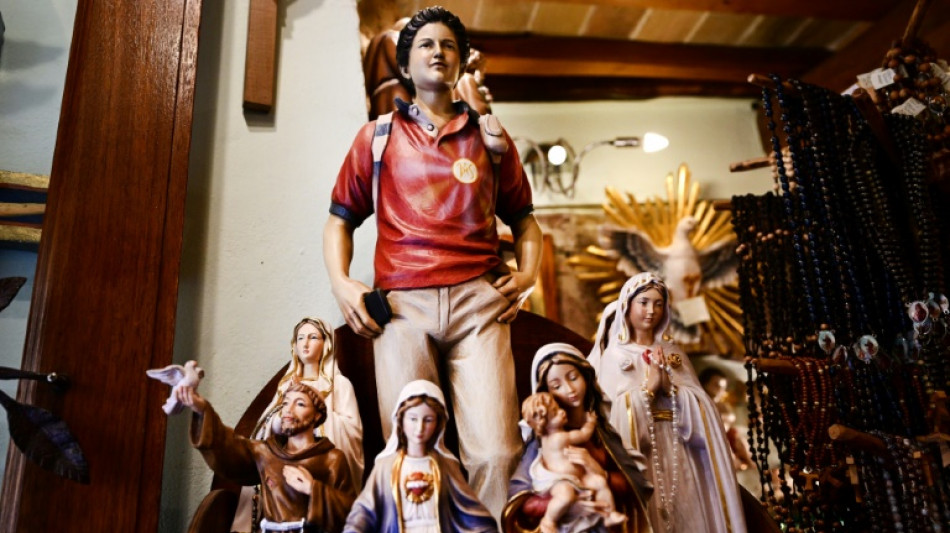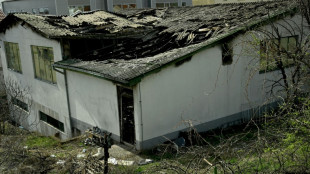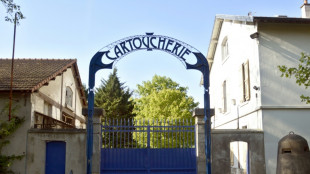
Pilgrims in Italy flock to tomb of first millennial saint

Assisi has long been a place of pilgrimage, but these days the faithful come not for Saint Francis but for a tech-savvy teen soon to become the first millennial saint.
Carlo Acutis, who died of leukaemia in 2006 aged 15, will be canonised in a mass at the Vatican on April 27.
Dubbed "God's Influencer" or the "Cyber Apostle", he spent much of his short life spreading the Catholic faith online. In death, he is drawing a new generation of pilgrims to his resting place.
The medieval hilltop town of Assisi is famous as the 12th-century birthplace of Saint Francis, who founded the religious order of the Franciscans.
But among the stone streets and bell towers, the image of a smiling boy in a red polo shirt has joined the portraits of Francis in his sackcloth robe.
Pilgrims flock to pray before Carlo's body in the Church of Santa Maria Maggiore, the Sanctuary of the Spoliation, where it has been on public display in a glass tomb since 2022.
His remains have been embalmed and his youthful face and jet-black hair are astonishingly lifelike. He is clothed as he once dressed, in jeans and trainers.
US teenager Monica Katreeb, who visited with a group of students, told AFP he was more "relatable" than the medieval martyrs and their austere daily lives.
"To see someone that looks like you and is wearing the clothes that you would wear... how cool is that?" she told AFP.
She planned to attend the canonisation mass later this month at the Vatican, which she said she expected to be a "spectacular moment".
- 'Sign of hope' -
Carlo was born in London to Italian parents on May 3, 1991, but mostly brought up in Milan. He spent holidays in the family's second home in Assisi, and eventually died in Monza, northern Italy.
His family was wealthy and not religiously observant, but from a young age, Carlo was imbued with a precocious and ardent faith, attending mass every day.
His mother, Antonia Salzano Acutis, remembered a well-behaved and generous boy who "gave away all his toys, always with a smile".
"I felt he was a special, extraordinary boy," she told AFP in the garden of the foundation dedicated to her son located on the hills above Assisi.
At nine years old, he was helping homeless people on the streets, bringing them food, she recalled.
"He said, 'I have everything, these people have nothing, is that fair?'"
The teenager had a gift for computers and spread the teachings of Jesus Christ online, notably creating a digital exhibition on miracles.
"We live in a complex society where technology sometimes seems to absorb everything," Salzano Acutis said.
"Why is Carlo a sign of hope? Because he passed through all these things unscathed, he showed that we must be masters of these things, and above all he used them for good."
Katreeb agreed, saying many young people were swept away by "doom-scrolling" on social media, which led sometimes to darker online content such as pornography.
Carlo had shown an alternative, that "we just flood it with God's message", she said.
- Icons and towels -
The Vatican has recognised two miracles associated with Carlo, which under Catholic rules are a prerequisite for his canonisation.
It claimed in 2020 that he had posthumously interceded in 2013 to cure a Brazilian boy suffering from a rare pancreatic disease.
Then last year, the Vatican attributed to him the healing of a Costa Rican student seriously injured in an accident.
"Every day we receive news of miracles, healings, and conversions," his mother said.
Word is spreading, with Carlo's tomb attracting increasing numbers of pilgrims and curious visitors.
The diocese last year welcomed nearly a million people, and more than 400,000 so far this year.
In souvenir shops, merchants are seeing a growing interest in items bearing Carlo's image, from statuettes, icons, rosaries to T-shirts and bath towels.
The bishop of Assisi, author of a book on the links between Carlo, Francis and Saint Clare of Assisi -- one of the first followers of Francis -- said he hoped the canonisation would attract a "new flow" of faithful.
Carlo walked the streets of Assisi while he was alive, he "has breathed many things that belong to the spirituality of Francis, and has translated them into a contemporary spirituality", bishop Domenico Sorrentino told AFP.
D.Petit--PS

 London
London

 Manchester
Manchester
 Glasgow
Glasgow
 Dublin
Dublin
 Belfast
Belfast
 Washington
Washington
 Denver
Denver
 Atlanta
Atlanta
 Dallas
Dallas
 Houston Texas
Houston Texas
 New Orleans
New Orleans
 El Paso
El Paso
 Phoenix
Phoenix
 Los Angeles
Los Angeles



